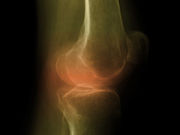Significantly lower risk of revisions, aseptic revisions; no reduction in risk of prosthetic joint infections
TUESDAY, March 14, 2017 (HealthDay News) — For patients undergoing total hip (THA) and total knee arthroplasty (TKA), selective serotonin reuptake inhibitor (SSRI) use is associated with a lower risk of revisions, according to a study presented at the annual meeting of the American Academy of Orthopaedic Surgeons, held from March 14 to 18 in San Diego.
Hilal Maradit-Kremers, M.D., from the Mayo Clinic in Rochester, Minn., and colleagues conducted a retrospective analysis involving adult patients who underwent 20,091 primary and revision THA and TKA surgeries from 2002 through 2009.
The researchers found that 6.4 percent of patients had a diagnosis of depression, and SSRIs were administered in 7.8 percent of surgeries. There were correlations for depression with increased risk of prosthetic joint infections during the first year after surgery, and with overall long-term risk of revisions and with aseptic revisions (hazard ratios [HRs], 1.9 [95 percent confidence interval [CI], 1.1 to 3.1], 2.2 [95 percent CI, 1.8 to 2.8], and 2.6 [95 percent CI, 1.7 to 3.9], respectively). The risk of prosthetic joint infections was similar for SSRI-treated and untreated patients (HR, 0.7; 95 percent CI, 0.3 to 1.2). Arthroplasty patients who received SSRIs had significantly lower risk of revisions and aseptic revisions compared with those who did not receive SSRIs (HR, 0.4 [95 percent CI, 0.3 to 0.7] and 0.4 [95 percent CI, 0.2 to 0.7]).
“Receiving SSRIs in the perioperative period is associated with a lower risk of revisions in arthroplasty patients,” the authors write.
Copyright © 2017 HealthDay. All rights reserved.








